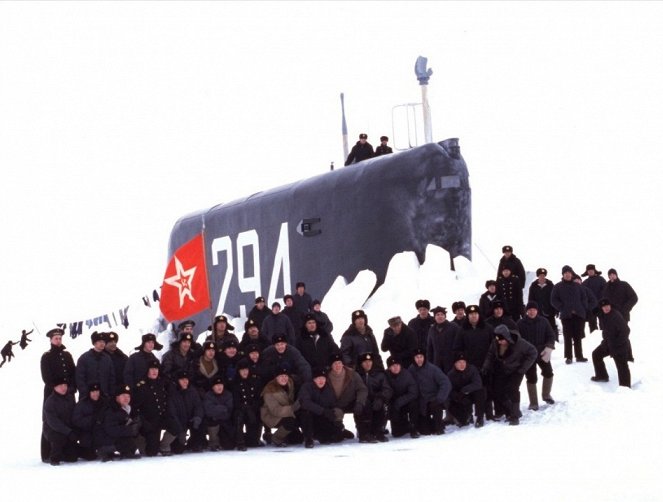Regie:
Kathryn BigelowDrehbuch:
Christopher KyleKamera:
Jeff CronenwethMusik:
Klaus BadeltBesetzung:
Harrison Ford, Liam Neeson, Christian Camargo, Ravil Isyanov, Roman Podhora, Steve Nicolson, Tim Woodward, Kris Holden-Ried, Christopher Redman (mehr)Inhalte(1)
Noch bevor das russische Atom-U-Boote K-19 vom Stapel läuft gibt es zahlreiche Probleme - hinter vorgehaltener Hand erhält es bereits zu diesem Zeitpunkt den Beinamen "Witwenmacher". Auf Befehl der russischen Regierung übernimmt Cpt. Alexi Vostrikov das Kommando über das Schiff kurz bevor es in See sticht. Der ehemalige Kapitän Viktor Gorelov ist fortan zweiter Mann, was von Anfang an zu Spannungen an Bord führt. Mitten im Ozean passiert die Katastrophe Das Boot droht mitsamt seiner radioaktiven Ladung zu explodieren, was unabsehbare Folgen für das bereits stark angespannte Verhältnis der beiden Supermächte USA und UdSSR haben würde. Plötzlich liegt das Schicksal der ganzen Welt in der Hand einer überlasteten Mannschaft und seiner beiden Kommandanten, die ihre persönlichen Differenzen angesichts der entsetzlichen Umstände beiseite legen müssen... (Verleiher-Text)
(mehr)Videos (2)
Kritiken (5)
Wunderschön in seiner ganzen Naivität. Ich liebe U-Boot-Filme, und dieser hat alles, was wichtig ist: Drama, Atmosphäre, einen charismatischen Kapitän (eigentlich zwei) mit einer seltsam unrussischen Aussprache... Er hat auch viel Pathos, das, wenn man es auf die Menschen in der UdSSR, die Kameradschaft und die Partei anwendet, eine ganz neue (etwas sarkastische) Dimension annimmt und irgendwie bestätigt, dass ein westlicher Filmemacher, um die östliche Mentalität zu verstehen, sie vollständig an seine eigene anpassen muss. Aber das ist nur eine weitere positive Seite dieses unterhaltsamen Spektakels, das alle Attribute eines hochwertigen Schauspiels unter Wasser aufweist. Auf Comrades!
()
Fast Spitze. Wie erwartet wird der Film hauptsächlich von Ford und Neeson getragen, aber ich war überrascht, wie Kathryn Bigelow das Thema aufnahm. K-19 ist zwar kein zweiter Das Boot, aber er ist um einiges besser als U-571. P.S. Die Musik von Klaus Badelt ist so unglaublich schön, dass ich unheimlich große Lust habe, nur für sie einen fünften (und richtig roten) Stern zu vergeben. P.P.S. Und ich gebe ihn auch.
()
I've known Kathryn Bigelow is good since I saw her Strange Days. The first two thirds of K-19 are excellent, they have momentum, they show the mess in the Soviet army, the scene of the reactor repair is both frightening and impressive. But the last act loses a lot of the pace, it is too pathetic and tearful, but it’s still a good film overall. I really don’t understand the complaints about boredom. I think it’s three and a half stars.
()
Excellent acting performances and precise directing. I like battles against fate and this is a really tough one. The mindset of the Soviets that says never settle for defeat is extremely tangible and in some cases in this movie it triumphs the instinct to survive, as we see in the powerful scenes where they are repairing the reactor.
()
K-19 is in no way an accurate depiction of the events surrounding the damaged Soviet submarine. It is an American film intended primarily for an American audience, so naturally they added an American ship that can help the Soviets, somewhat complicating the story. The behavior of the officers and crew on board corresponds to the American understanding of duty and their view of Soviet reality. In many details, the film is inaccurate in depicting the realities of submarine vessels and nuclear technology, but that is a relatively minor matter for the average viewer. As for the accident itself, those boys who entered the reactor room knew very well that they were going to die, and contrary to the film, they had anti-radiation suits, which, however, were useless in the face of the damaged reactor. In fact, this only enhances their heroism. Radiation sickness does not progress as described in the film; the affected person does not show such pronounced external signs of damage, but rather the risks of blood cell breakdown. A patient with such a high dose quickly loses consciousness and does not talk. Kathryn Bigelow directed the film reliably but conservatively. It would have benefited from some Fincher-like clever shots and an effort to tell the story visually, as sometimes it is moved forward only through long dialogues. The atmosphere on the submarine could have been more intense. The performances are convincing, and the casting worked professionally. The film was a painful failure because American viewers are self-centered, and the story of the Soviet crew was distant to them. The European market did not save it, and at that time, Russia was more focused on copying and thriving on the black market than on releasing the film for regular distribution. Overall impression: 75%.
()
Galerie (39)
Photo © 2002 Paramount Pictures



Werbung